- Home
- Patricia Briggs
River Marked mt-6 Page 6
River Marked mt-6 Read online
Page 6
“You think it might have been some local spirit imitating your father?” Adam asked.
He’d finished his hot dog and was in the middle of cooking another. He liked them burnt on the outside—I liked mine just shy of hot.
I watched my hot dog warm and tried to pretend I could believe that. “Maybe. Maybe there is something like a weird doppelganger who appears to other people or a backward foreganger—a death’s-head who appears after a man dies instead of three days before.”
Adam tilted his head at me, then shook it. “If you really thought it was some native critter, you’d be calling Charles.”
Adam was right. If Charles thought I was really in trouble, he’d help however he could. He might be scary, but he was family. Sort of.
Adam gave me a shrewd look. “You just don’t like the idea that your father visited you, and you don’t know why.”
And why Joe Old Coyote hadn’t shown up sooner.
Damn it, I chided myself. I knew better than that. A ghost wasn’t a person; it was just the leftovers. That ghost might be the ghost of my father, but he wasn’t my father.
He’d died before I was born. But I hadn’t suffered. I’d been raised by Bryan and Evelyn, my foster parents, and they had loved me. When they died, Bran and the rest of his pack had stepped in—and then my mother. I’d never been unloved, never mistreated. I was an adult—so why did the sight of a ghost who looked like my father make me feel so raw?
“Okay,” I said. “Yep. You’re right. If he could visit anytime, why didn’t he? Why now when I don’t need him?” I’d rather have believed it wasn’t my father.
He put his arm around me. “Maybe it was some sort of vision quest without the fasting part.”
I shook my head. “Nope, I already did my vision quest.”
He pulled back, so he could see my face. “Really?”
“Uhm,” I answered. “The summer Charles taught me to fix cars. One day he just took me out into the forest. We fasted for three days, then he told me not to shift into a coyote and sent me off into the mountains.”
“What did you see?” Adam asked. “Or is that supposed to be a secret?”
I snorted. “Sacred, not secret, I think.” Though the only person I’d ever told what I saw had been Charles. “But mine was pretty weird. I asked Charles if I did it wrong, and he just gave me that look—” I tried to freeze my face into an emotionless but somehow terrifying mask—and Adam grinned.
“What did he say when you showed him that expression?” he asked.
Only an idiot would make fun of Charles to his face. Adam knew me so well.
“He asked me if I’d eaten something that made me sick,” I said. “Though he turned his head, so I couldn’t see his expression. I think he might have smiled.”
Adam laughed. “So back to your vision.”
“Right,” I said. “So my vision was a little ... Charles told me that there was no right or wrong way to have a vision. It just was. Then he told me about some guy who had a vision and found out he could talk to spirits. Elk Spirit came to him and told him he had to serve Elk Spirit and to do that he had to dress only in yellow. Or maybe that was blue. So this guy, he did that for a few years until Bear Spirit came and told him he’d been talking to Elk Spirit and decided that it should be Bear Spirit he listens to. So Bear Spirit told him to paint his face red and walk backward. When Charles’s grandfather, the medicine man, met this man, he had been walking backward for years and years. Charles’s grandfather heard the man’s story, and told him, ‘Just because you listen to spirits does not mean you must obey them.’” I’d almost forgotten that Charles had shared that story with me. It was a sign, I suspect, of how upset I’d been that I hadn’t had the kind of vision quest I had expected—one with eagles and deer who guide me to enlightenment.
“What happened?” Adam asked.
“Your hot dog is on fire,” I told him.
He pulled the black thing out of the fire, tapped it on the ground, and it broke into pieces. He got another hot dog and stuck it on the campfire fork, while I ate mine.
“Mercy, what happened to the guy who was walking around backward?”
“He washed his face and started walking forward. After about five steps, he tripped and broke his leg.”
“You are making that up,” said Adam, pulling his hot dog in for inspection. It wasn’t black, so he stuck it back in the fire.
I lifted my hand. “Scout’s honor, that’s the story Charles told me. You ask him if you can’t tell if I’m lying or not.” That was sort of a put-down among werewolves. Only a very new werewolf wouldn’t be able to sense truth from falsehood. “Charles said that the man never did go back to walking backward, though.”
“You have to be a boy to say, ‘Scout’s honor,’” Adam told me.
“Nah-uh. Girl Scout leader, here.” I pointed my thumb at my breastbone. “Sort of. When my mom couldn’t do it. Anyway, you wanted to hear about my vision.”
“Yes.”
I opened my mouth to tell him a funny version, but what came out was different from what I’d intended.
“One moment I was sitting alone in the middle of a forest; the next I was walking in a different place. Everything was gray, almost like a black-and-white film except there was no white or black, just odd shades of gray. There was no grass or trees, just endless mounds of sand. It felt ... empty. Like those postapocalyptic horror films, you know? Empty but scary, too.”
I could feel it now as I had then: the tightness in my chest that made it difficult to breathe, the way the hair on the back of my neck had stood up because I knew that there was evil lurking, watching.
Adam pulled his hot dog out of the fire, but instead of eating it, he forced the blunt end of the fork into the ground, so it stuck up like a bizarre garden ornament. Then he pulled me against him, and my tension eased so I could breathe normally again.
“Sorry,” I said. “I didn’t expect it to bother me so much.”
“You don’t have to tell me.”
“No,” I said. “But I want to.” It felt right. Charles had told me I’d know when it was time to share what had happened to me. Some people were required to tell their experience to every person they met, but most of us only shared with a few people.
“So I was wandering through this desolate place. The only thing I could see besides sand were remnants of buildings. In the beginning, some of the buildings were modern—tall structures made of glass and steel. On those, the glass was cracked or broken and the steel rusted nearly through. As I continued on, the ruins started to be older buildings, houses. I clearly recall seeing what was left of an old Victorian, tipped awkwardly on its side as if it had been a giant dollhouse some child had kicked over. Then it was like something you’d see on a Western film set, but decades later. Blackened poles from adobe buildings half-buried in the sand, hitching posts and broken boardwalks, with dead weeds poking out.
“I’m the only living thing in the place.
“Eventually, there are only tent poles, and I am walking by them, crying, sobbing, with snot dripping from my nose—the whole wretched business though I don’t know what I am grieving for.”
“How old were you?” Adam asked.
“That was after Bryan died,” I answered. “Just after, I think.” Just talking about what I’d seen rattled me, my jaw vibrating as if I were cold, though Adam was warm and solid against me. He was real, but somehow that long-ago vision was real, too. “So fourteen or thereabouts.”
Telling Adam was almost like living through it again. The emotions had been real and powerful, maybe the most real thing about the whole vision.
“Finally, I came up to this car—an old Model T Ford buried up to its axles. It was so sad, I could feel its sorrow weighing down my heart, distracting me from whatever had caused me to cry in the first place. I put my hands on it, but there was no way to dig it out or fix it. I explained that to the car, as if it could understand what I was saying because I felt as thoug
h it could. I told it I was sorry I couldn’t do more.
“Then, under my fingers it began to vibrate, shaking until I couldn’t hold it anymore. I had to close my eyes against the sand it stirred up, and when I opened them, I was alone in a forest.”
I remembered how frightened I had been in the forest. My pulse picked up, and goose bumps covered my forearms. The forest should have been a relief from the dead grayness I’d been in. The forest had been my second home—but the forest of my vision had hidden watchers, dangerous watchers who didn’t approve of me.
“It was a dark forest. Although all the trees were conifers, they’d formed a thick canopy over the top of me—like in a rain forest. I could feel that I was watched, but no matter how hard I looked, I never saw them. My watchers followed me as I walked. Eventually, I started running, and I panicked like a rabbit. It seemed as though I ran for hours. Every time I slowed down, I could feel them closing in on me. So I didn’t slow down.” Remembered fear had me sweating, and the muscles on the back of my neck were tight. “I never saw anything while I ran. Never knew what was chasing me. I just knew I was the prey in this race. I knew absolutely that if they caught me, I was dead.
“I looked over my shoulder as I ran full tilt through the forest, and my foot caught a downed tree. I tumbled down a hill and landed at the foot of a La-Z-Boy.”
“A what?” Adam asked.
“I told you it was weird. A La-Z-Boy, one of those big recliners. This one had a big tag on it that said ‘La-Z-Boy.’ It should have felt out of place in the forest, but instead it was I who didn’t belong.” The recliner had been orange and blue plaid. Ugly.
“At first all I saw was the chair, then I could tell it was occupied by a tall, handsome Indian man who looked not at all impressed by me.”
Funny. I could remember the color of the chair as if I’d just been staring at it, but I couldn’t really remember the Indian man’s face or what he was wearing. I don’t think I noticed anything except his eyes.
“I got to my feet. My jeans were torn, my shirt was ripped, and there was a long, painful scratch on my side. There were sticks in my hair. I felt as if I were someplace I didn’t belong, somewhere no one wanted me. I raised my chin and met his gaze, eye to eye, though I knew in my heart it was a stupid thing to do.” The panic had been gone, replaced by a hollow emptiness that felt like nothing could ever fill it.
Adam’s hand tightened on my shoulder.
“As soon as I began the stare-down, a fox, a lynx, and a bear came out of the woods. A huge bird that looked like a giant eagle dropped out of the sky, and they all stared at me, but I kept my eyes on the man in the chair.”
It had been unexplainably horrible, knowing that I did not belong in that forest with the Indian man and the animals. I was an outsider, alone.
“Steady,” murmured Adam.
“The man finally said, ‘Who are you who walks in my forest, half-breed?’ I could tell he didn’t mean that he wanted to know my name. He wanted to know what I was.” I couldn’t explain it right. “The essence of the person I was.”
“What did you tell him?” Adam asked.
“I told him that I was coyote.” I cleared my throat. “He stood up. And up. He was a lot taller than I was, as tall as the trees around us and somehow more real than they were. I know that’s an odd visual picture, but it was just the way it was. Without dropping my gaze, he said, ‘I am Coyote.’ He sounded pretty offended.”
I sucked in a breath. “I probably should have given him my name. It wasn’t the right answer—but it wouldn’t have been the wrong one, either. So I said, ‘Okay. You can be Coyote. But I am a coyote.’ He considered my answer, then he bent down to whisper in my ear.” I felt stupid about this last.
“What did he say?”
“He said, ‘Okay. You can be a coyote, too. But you’re a silly little thing, and I am a silly old thing.’ And then I woke up.”
“Do you know what it meant?” Adam asked.
I laughed and shook my head.
“That’s a lie,” he whispered, pulling me closer.
“It meant that I’m not Indian enough,” I told him. “I don’t belong anywhere.”
He burned another hot dog while we sat together and watched the flames.
“I think you’re wrong,” he told me, finally. “It didn’t sound like Coyote was rejecting you.”
“He was talking about my coyote half,” I said.
Adam smiled and rocked me a couple of times. “How confusing it must be to have a coyote half, a human half, an Indian half, and a white half.”
I snickered and felt better. It was seldom a good idea to take myself too seriously. “All four halves are pretty happy about being married to you right now. Maybe I’m wrong. Maybe it meant that we should get matching La-Z-Boys.” Though I would pick better colors. “If you don’t pull that hot dog out pretty soon, you’re going to go to bed hungry.”
“Mmm,” he rumbled into my ear. “I thought that being married meant that I never go to bed hungry.”
* * *
WE CAME BACK OUT AFTER A WHILE, STOKED UP THE fire, and cooked the rest of the package of hot dogs.
4
THE NEXT DAY, WE LEFT THE TRAILER IN THE EMPTY campground—Adam had been responsible for setting up the security, after all—and drove back across the river, on past the oddly named town of The Dalles and the less oddly named town of Hood River to Multnomah Falls. Someone once told me there is about a ten-mile stretch where the annual rainfall increases by an inch a mile. Truth or not, not far west of Hood River the scrub is replaced by lots and lots of trees and other green stuff. A few miles farther on, the waterfalls begin.
Multnomah is the most impressive, but there are dozens of waterfalls on Larch Mountain, and we spent most of the day hiking the trails that webbed the mountainside from one falls to another. Since it was a nice day in the middle of summer, there were a lot of other people doing the same thing.
I didn’t mind the company, and I didn’t think Adam did, either. It felt like we were a friendly party of strangers, drawn together by the extraordinary beauty of water dropping in white sheets from rocky cliffs. There was a sense of awe that connected us all, bringing us together. The ties were not as real as the pack bonds, but it felt like the beginnings of the same thing. It was magic, just a little of it, built of fair weather and joy.
That feeling of belonging to something greater than myself was the gift Adam gave to me.
My whole life I’d been an outsider: first a coyote raised in a pack of werewolves, then a supernatural outsider in my mother’s mundane household, finally an outsider who had too many secrets to really have friends. I was good at appearing to fit in, so no one really took notice of me.
Until Adam. With Adam beside me, I felt like I belonged, like he was my connection to the rest of the world. And because of him, I could be just one of these happy hikers who were out to enjoy themselves. I shook off the faint shadow that recalling my vision had left upon me. Indian or not, coyote or human, I wasn’t alone anymore.
Some of the trails were easy, even handicap accessible. Not too far from Multnomah, those all went away, and the fun started in earnest. The top of the mountain is a little more than four thousand feet above the trailhead, and not much of that climb is gentle.
* * *
I HEARD THE CRYING BEFORE I SAW THEM. THINKING someone was in trouble, I broke into a jog up the trail, and Adam ran behind me.
“Honey, I can’t carry you.” The woman’s voice was on the edge of tears. “I just can’t. You have to be a big boy and help me, Robert.”
There followed a boy’s voice, unintelligible to me and interspersed with sobs.
Around a bend in the trail we came upon two very upset people. A frazzled woman in her forties and a boy with a tear- and dirt-streaked face.
“Hey,” I said. “Sounds pretty rough. What can we do to help?”
She started to refuse help—and then her eyes fell on Adam and lit up with avarice.
I sympathized with her entirely—but was happier when I realized it was the strength of his back she was excited about and not his pretty face.
Her son was not nearly as excited as his mother. Robert, his mother informed us, was eight, but he had Down’s syndrome and was as wary of strangers as most two-year-olds. He wasn’t happy about the idea of Adam hauling him down the mountain to the parking lot.
While his mother tried to reason with him, Adam got down on one knee and looked the boy in the eye. He didn’t say anything at all. But after almost a full minute, the boy nodded, and when Adam stood up, he climbed onto Adam’s back without another protest. He still wasn’t happy about it, but he knew who was in charge.
“Well,” said Robert’s mother, flabbergasted.
“Adam’s good at giving orders,” I told her truthfully. “Even without saying anything.”
So Adam carried one very tired and cranky eight-year-old boy who had a sprained ankle down the trail while the boy’s even-more-tired mother thanked him all the way.
“I didn’t know it would be so steep,” the boy’s mother said to me, when Adam stretched his legs a little and got ahead of us. I thought it was to stop her incessant thanks, but maybe I was being uncharitable.
“Robert was so tired of being in the car. Eugene is still a long way, and I thought it might be nice if he ran off some energy; then he would sleep the rest of the way. I hope your young man doesn’t hurt himself. Robert weighs almost eighty pounds.”
“Don’t worry,” I assured her. “Adam was in the army. He can carry an eighty-pound pack down the mountain. That’s also why he knows the difference between a twisted ankle, a sprained ankle, and a break.”
I wasn’t going to tell her that he was a werewolf who could probably carry us all down if he could figure out a good way to make a manageable bundle of us. Adam was out to the public, but neither Robert nor his mother looked like people who could deal with werewolves at this point in their trip. The army part was true—they didn’t need to know that his army life was back in the Vietnam era.

 Wolfsbane
Wolfsbane When Demons Walk
When Demons Walk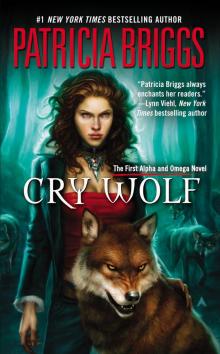 Cry Wolf
Cry Wolf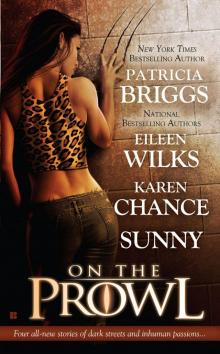 On the Prowl
On the Prowl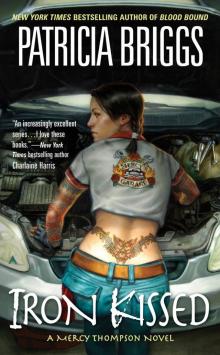 Iron Kissed
Iron Kissed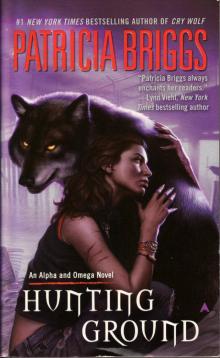 Hunting Ground
Hunting Ground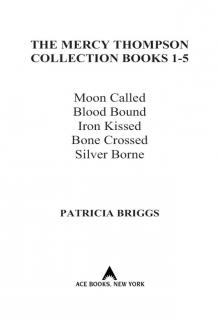 Patricia Briggs Mercy Thompson: Hopcross Jilly
Patricia Briggs Mercy Thompson: Hopcross Jilly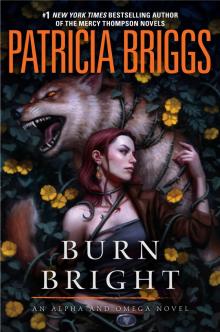 Burn Bright
Burn Bright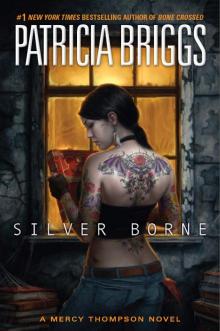 Silver Borne
Silver Borne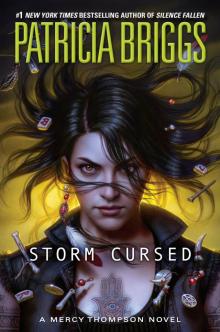 Storm Cursed
Storm Cursed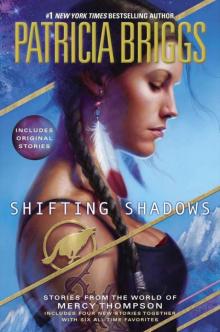 Shifting Shadows
Shifting Shadows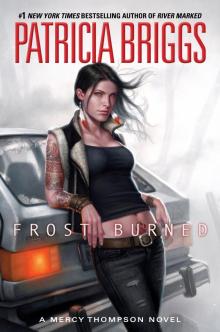 Frost Burned
Frost Burned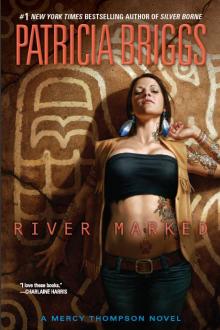 River Marked
River Marked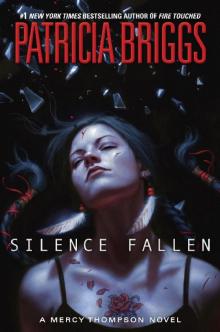 Silence Fallen
Silence Fallen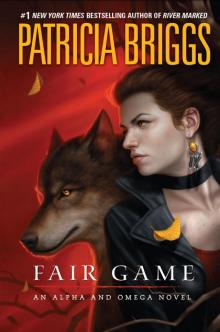 Fair Game
Fair Game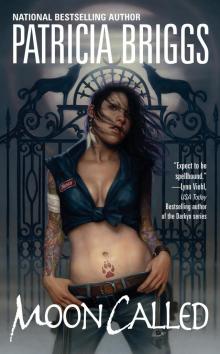 Moon Called
Moon Called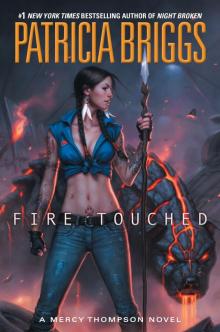 Fire Touched
Fire Touched Dead Heat
Dead Heat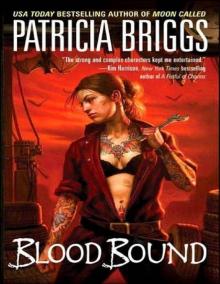 Blood Bound
Blood Bound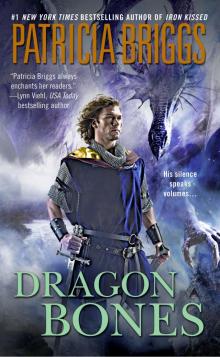 Dragon Bones
Dragon Bones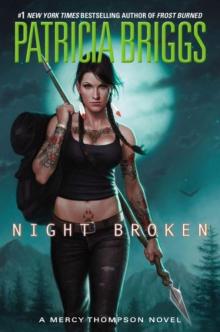 Night Broken
Night Broken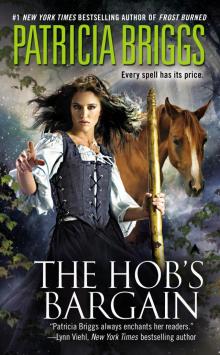 The Hobs Bargain
The Hobs Bargain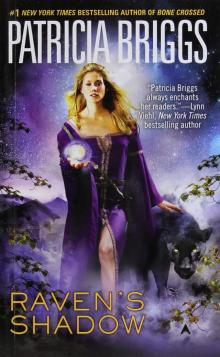 Ravens Shadow
Ravens Shadow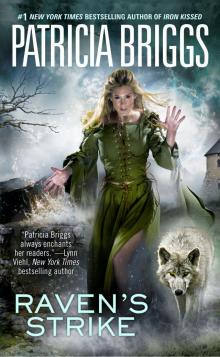 Ravens Strike
Ravens Strike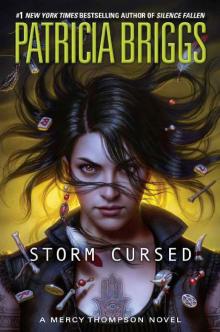 Storm Cursed (A Mercy Thompson Novel)
Storm Cursed (A Mercy Thompson Novel)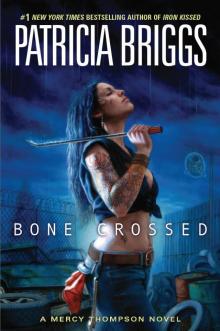 Bone Crossed
Bone Crossed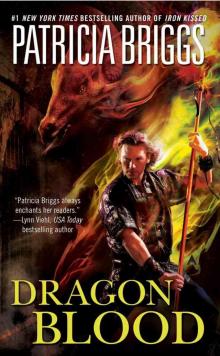 Dragon Blood
Dragon Blood Smoke Bitten: Mercy Thompson: Book 12
Smoke Bitten: Mercy Thompson: Book 12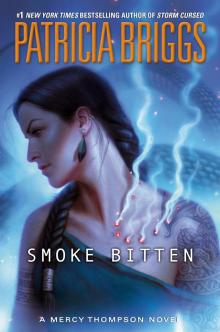 Smoke Bitten
Smoke Bitten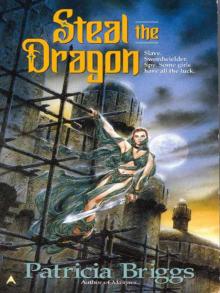 Steal the Dragon
Steal the Dragon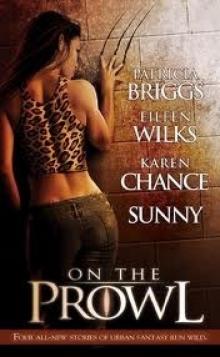 0.5 On The Prowl (alpha and omega)
0.5 On The Prowl (alpha and omega)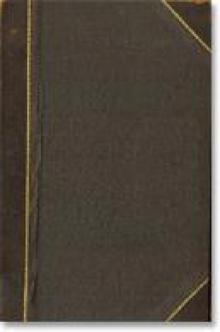 Alpha and Omega
Alpha and Omega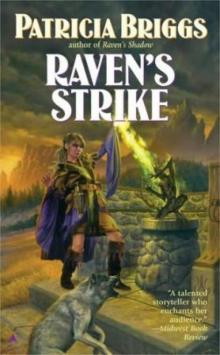 Raven's Strike rd-2
Raven's Strike rd-2![[Mercy 03] - Iron Kissed Read online](http://i1.bookreadfree.com/i/03/24/mercy_03_-_iron_kissed_preview.jpg) [Mercy 03] - Iron Kissed
[Mercy 03] - Iron Kissed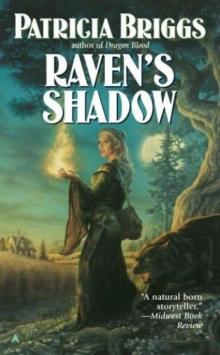 Raven's Shadow rd-1
Raven's Shadow rd-1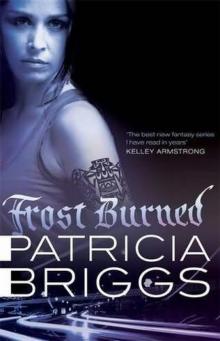 Frost Burned mt-7
Frost Burned mt-7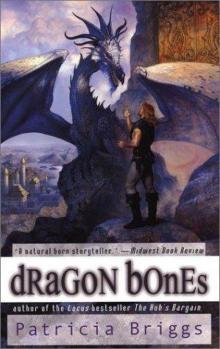 Dragon Bones h-1
Dragon Bones h-1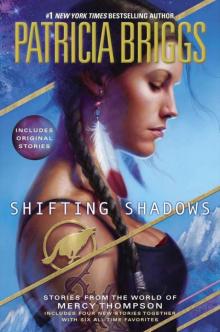 Shifting Shadows: Stories from the World of Mercy Thompson
Shifting Shadows: Stories from the World of Mercy Thompson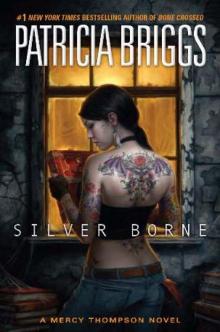 Silver Borne mt-5
Silver Borne mt-5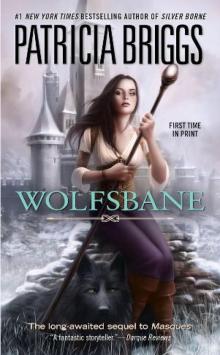 Wolfsbane s-2
Wolfsbane s-2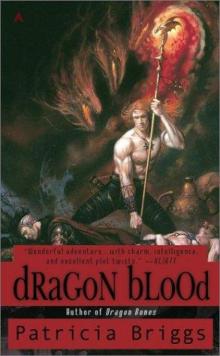 Dragon Blood h-2
Dragon Blood h-2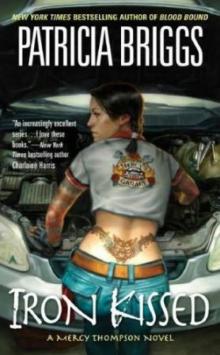 Iron Kissed mt-3
Iron Kissed mt-3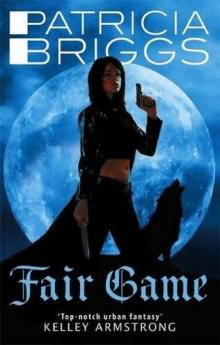 Fair Game aao-3
Fair Game aao-3 Masques s-1
Masques s-1![[Hurog 01] - Dragon Bones Read online](http://i1.bookreadfree.com/i1/04/03/hurog_01_-_dragon_bones_preview.jpg) [Hurog 01] - Dragon Bones
[Hurog 01] - Dragon Bones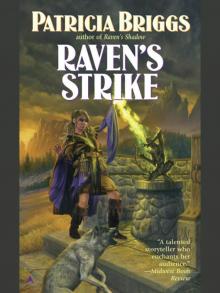 Raven s Strike
Raven s Strike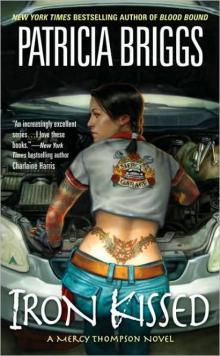 Mercedes Thompson 03: Iron Kissed
Mercedes Thompson 03: Iron Kissed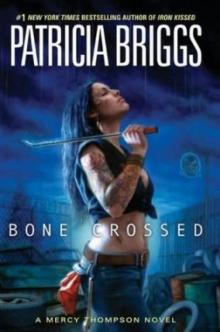 Bone Crossed mt-4
Bone Crossed mt-4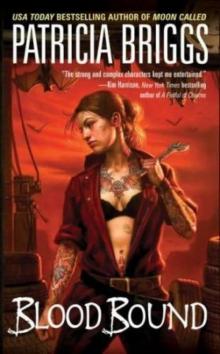 Blood Bound mt-2
Blood Bound mt-2![[Mercy 01] - Moon Called Read online](http://i1.bookreadfree.com/i2/04/09/mercy_01_-_moon_called_preview.jpg) [Mercy 01] - Moon Called
[Mercy 01] - Moon Called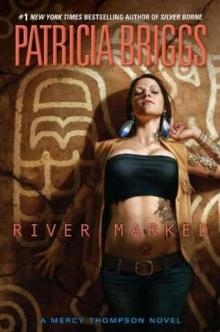 River Marked mt-6
River Marked mt-6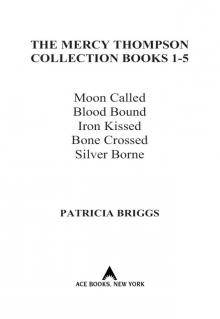 The Mercy Thompson Collection
The Mercy Thompson Collection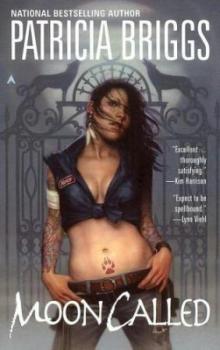 Moon Called mt-1
Moon Called mt-1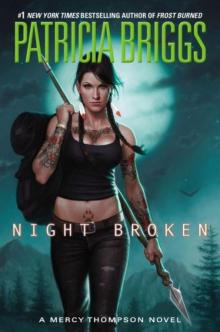 Mercy Thompson 8: Night Broken
Mercy Thompson 8: Night Broken